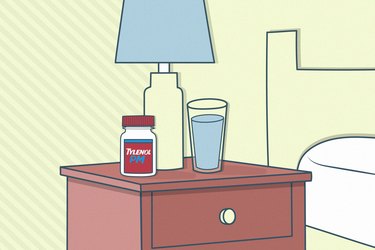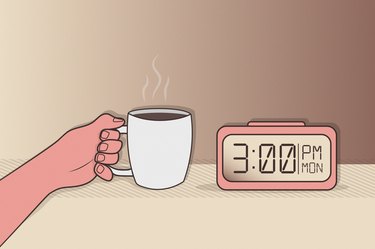
Benadryl can get allergy symptoms under control or help you doze off on a night when you're struggling with sleep. But what if you need it more often than not?
In other words, is it bad to take Benadryl every day?
Video of the Day
Video of the Day
Here's what to know about how the med can affect you and when it's time to consider an alternative.
First, What's in Benadryl?
The active ingredient in Benadryl is diphenhydramine, an antihistamine that can relieve allergy symptoms like itching, watery eyes and runny nose.
In short, it blocks histamine, a chemical released in your body in response to an allergic reaction or exposure to an allergen, Jeanne Lomas, DO, a board-certified pediatric and adult allergist and Director of Allergy & Immunology with WellNow Allergy, tells LIVESTRONG.com.
Diphenhydramine also works as a sleep aid. So, why does Benadryl make you sleepy?
While all antihistamines can cause drowsiness, "older antihistamines like diphenhydramine tend to depress the central nervous system more and cause increased sedation compared with newer antihistamines like loratadine (Claritin), cetirizine (Zyrtec) and fexofenadine (Allegra)," Dr. Lomas says.
Long-Term Effects of Taking Benadryl
Benadryl is generally considered safe for most healthy adults. But it's not necessarily the best choice for keeping your allergy symptoms in check day to day. Nor is it wise to rely on it to help you fall asleep, Dr. Lomas says.
Here's why:
1. You Increase Your Risk of Side Effects
Benadryl can cause side effects, which become more likely the more you take it. These include the following, per the National Library of Medicine:
- Dry mouth
- Drowsiness
- Dizziness
- Headaches
- Constipation
- Urinary retention
Taking it to manage your allergies isn't harmful for most people, but the side effects can be unpleasant and disruptive.
"There are other, less-sedating antihistamines that we commonly recommend and are safe to take daily for seasonal allergy relief," Dr. Lomas says.
See our list of the best over-the-counter allergy medicines, according to doctors.
2. It May Become Less Effective Over Time
As for taking Benadryl every day to sleep?
It's easy to develop a tolerance to over-the-counter sleep aids like diphenhydramine, so they become less effective over time, notes the Mayo Clinic.
That means you might end up taking more of the med to get the same effect, which is dangerous because you can overdose on Benadryl. In fact, taking higher-than-recommended doses of Benadryl can cause serious heart problems, seizures, coma or even death, per the FDA.
In short: "Patients shouldn't rely on Benadryl as a sleep aid for long-term use," Dr. Lomas warns.
How Often Can You Take Benadryl?
Adults using Benadryl for allergies should take 25 to 50 mg every 4 to 6 hours as needed, per the National Library of Medicine. If you're taking it for help falling asleep, take 50 mg 30 minutes before bedtime, recommends the National Library of Medicine.
You shouldn't take more than 300 mg of Benadryl per day for allergies, the National Library of Medicine notes.
As for using Benadryl as a sleep aid? The American Academy of Sleep Medicine doesn't recommend using it for insomnia (that is, persistent trouble falling or staying asleep), per February 2017 clinical practice guidelines.
If you're taking it for more than two weeks to help with sleep, see your doctor, because insomnia could be a symptom of an underlying medical illness, per the National Library of Medicine.
Who Should Avoid Taking Benadryl?
Benadryl's side effects can be more severe for certain people.
Adults over 65 who take the med may be more prone to drowsiness, which can increase the risk for confusion or falls. There's even some research linking diphenhydramine use in older adults to a higher chance for developing dementia, the Mayo Clinic points out.
People with closed-angle glaucoma, peptic ulcer and urinary retention should also steer clear.
Alternatives to Taking Benadryl
What you opt to use instead of Benadryl depends on your symptoms.
1. Other Antihistamines
For allergies, "I commonly recommend second-generation antihistamines like loratadine (Claritin), cetirizine (Zyrtec) or fexofenadine (Allegra), as these tend to last longer compared with diphenhydramine and are less sedating for most patients," Dr. Lomas says.
2. Lifestyle Changes
Lifestyle changes (aka, natural remedies for allergies) can go a long way toward making your symptoms more manageable, too, like limiting your exposure to allergens, keeping your indoor air clean and rinsing your nasal cavity.
3. In-Office Treatments
Ask your allergist about other therapies that might help.
"We can offer options such as allergy immunotherapy, which is one of the most effective treatments," Dr. Lomas says.
Allergy immunotherapy is a way to "train" your body to become less allergic, according to the American College of Allergy, Asthma & Immunology. It involves gradually exposing you to higher doses of the thing you're allergic to.
4. Work on Improving Your Sleep Hygiene
If you're struggling with sleep, healthy habits are generally a better bet than sleep aids, the Mayo Clinic says. To get better sleep:
- Get exercise during the day
- Adjust your bedroom environment so it's cool, dark and quiet
- Manage your stress
- Stick with a calming bedtime routine (think: journaling, meditating, reading a book)
5. Ask About a Sleep Evaluation
If the changes above don't do enough to improve your sleep, see a doctor, per the American Academy of Sleep Medicine. They may recommend a sleep evaluation to look for underlying issues that could be making it harder for you to snooze soundly.
So, How Bad Is It Really to Take Benadryl Every Day?
Benadryl can be a decent short-term option for easing allergy symptoms or helping you fall asleep.
But it's not the best medication choice for allergy maintenance, and you shouldn't rely on it for more than a night or two as a sleep aid. And you should never take more than the recommended dose.
- National Library of Medicine: "Diphenhydramine"
- Mayo Clinic: "Sleep Aids: Understand Options Sold Without A Prescription"
- FDA: "FDA warns about serious problems with high doses of the allergy medicine diphenhydramine (Benadryl)"
- American College of Allergy, Asthma & Immunology: "Allergy Immunotherapy"
- Journal of Clinical Sleep Medicine: "Clinical Practice Guideline for the Pharmacologic Treatment of Chronic Insomnia in Adults: An American Academy of Sleep Medicine Clinical Practice Guideline"
- National Library of Medicine: "DailyMed: Sleep Aid: diphenhydramine hydrochloride tablet, film coated"
- National Library of Medicine: "DailyMed: BENADRYL: diphenhydramine hydrochloride tablet, film coated"
Is this an emergency? If you are experiencing serious medical symptoms, please see the National Library of Medicine’s list of signs you need emergency medical attention or call 911.



